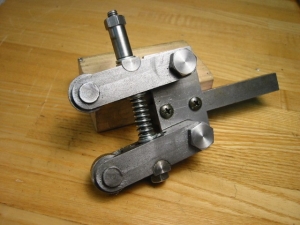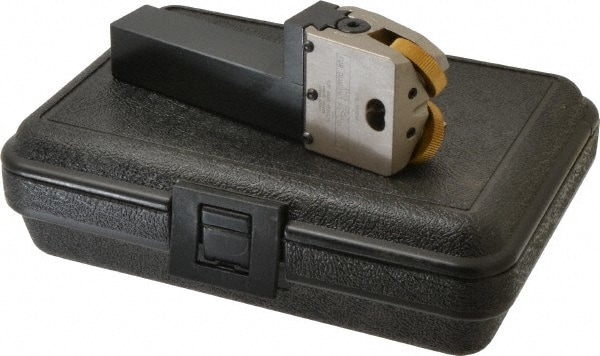Posted by Steviegtr on 04/08/2021 01:37:43:
Being really cheeky here. I know it has been done to death, but the knurling tool i bought from a sponsor on here is . Well lets say a bit to be desired. So i looked at the scissor type knurling tool & that is what i would like.
The only ones i can find are from India, yes they are catching up. Unfortunately they do not look very good quality….
Steve.
Joining the dots, I guess Steve refers to a bump-type knurler;

(Or the variant with two wheels.)
These are a poor choice for a small weedy lathe like a Myford, or a Chinese hobby machine of similar size. They require more sideways force than small machines can take. Steve doesn't want a better quality knurler, he needs a bigger lathe!
Scissor type knurlers are good for small machines because much of the force needed to squeeze knurls is provided by the balanced clamp. Not necessary to be a gorilla with a big lathe to make them work. Their disadvantage is they take more time to set-up than the bump-type.

Not necessary for a knurler to be well made. All it has to do is hold the wheels in more-or-less the right place. Knurling wheels don't have to run particularly true. However, as they take a fair hammering the wheels should be tough, otherwise the edges deform, rapidly wear out and spoil the knurl. Replace the wheels, not the whole tool.
I use an ordinary inexpensive scissor knurler, admittedly mostly on brass and aluminium, and it's fine after seven years. The wheels show no sign of wear yet. Not the best tool for production knurling steel, but 'good enough' for most hobby purposes I think.
For production work, the scissor knurlers are far from ideal – too much time wasted setting them up, and the knurls aren't of the best. For excellent consistent results, you need a Cut Knurler and a big machine:

The Dorian item illustrated above is yours from MSC at reduced price – only $1129.13
Dare I remind everyone again that engineers avoid the word 'quality' like the plague. In the absence of purpose, specification and value 'quality' is utterly meaningless. Other mindless words can be substituted:
- I want a quality lathe
- I want a nice milling machine
- I want a decent bandsaw
Provided tools are fit for purpose and value for money, excess quality is irrelevant, as is where they are made. You do of course have to define what 'fit for purpose' and 'value for money' mean in your workshop. Anything less thoughtful is lazy, because unless money is unlimited we have to navigate between 'too cheap' and 'too expensive'. Professional engineers are highly cost conscious. For hobby purposes, I find mid-range stuff from reputable UK suppliers mostly acceptable, send the odd item back if it's no good, and never chase 'quality' unless there's specific need for it.
Being an old cynic I reckon most 'quality' tools in a home workshop are placebos. The job could be done just as well with ordinary kit. But whatever makes you happy!

Dave
Edited By SillyOldDuffer on 04/08/2021 12:52:18
 Steviegtr.
Steviegtr.












